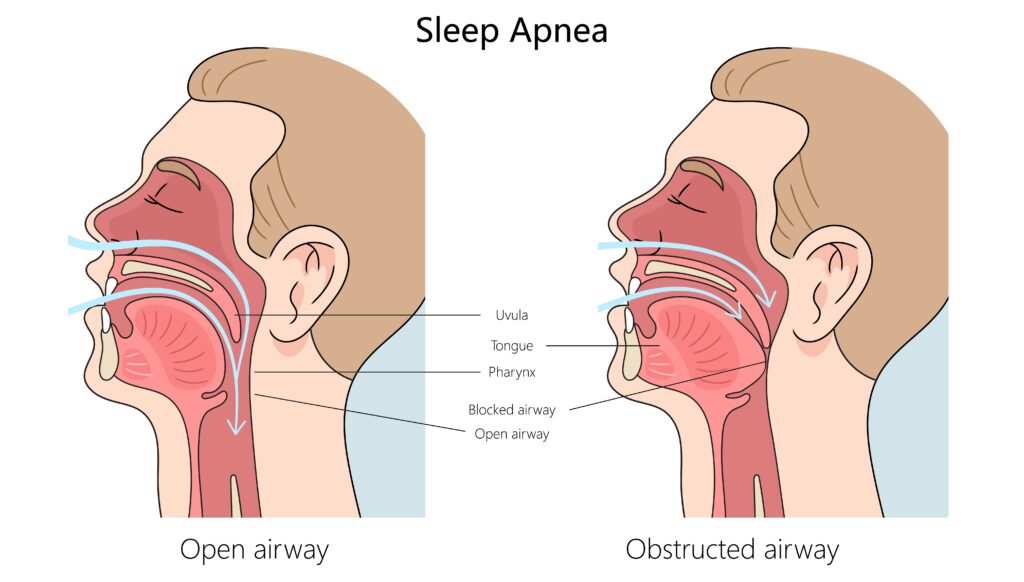
menu

Posted in Uncategorized | June 27, 2024

Does your partner often complain that you snore loudly? Do you constantly struggle to stay awake during the day?
You may have sleep apnea, which prevents you from getting a good night’s sleep. Restful sleep is critical for the body and brain, serving as a recovery function.
With the proper sleep apnea treatment, you can achieve healthy sleep and enjoy a better quality of life. Keep reading to learn about some signs that you may need sleep apnea surgery!

Sleep apnea is a serious sleep disorder in which breathing starts and stops repeatedly throughout the night. Once you stop breathing, your brain jolts you awake just enough to begin breathing again.
The periods of not breathing in sleep apnea can last for 10 to 30 seconds at a time, up to hundreds of times every night, while sleeping. If you have sleep apnea, the pauses in breathing can disrupt restful, healthy sleep even though you’re not fully awake.
The two main kinds of sleep apnea are central and obstructive sleep apnea.
In obstructive sleep apnea, the upper airway becomes blocked and closes off, keeping you from getting sufficient oxygen. Relaxed throat muscles or fatty tissue can block the airway.
Your tonsils, uvula, or tongue may also obstruct it. Obstructive sleep apnea is the most common form of sleep apnea.
The brain controls breathing. Central sleep apnea, which is less common, occurs when the brain fails to send the proper signals to the muscles that control breathing.
Without treatment, sleep apnea can increase the risk of various diseases, including diabetes, stroke, metabolic syndrome, high blood pressure, liver problems, and heart disease.

Your partner or another household member often notices sleep apnea. Your partner might complain of your loud snoring or notice your pauses in breathing. Other symptoms of obstructive and central sleep apnea include:
Surgery can be recommended for sleep apnea if:
Before recommending surgery, your ENT specialist at Specialty Care ENT will likely prescribe these non-invasive treatments first:
Lifestyle modifications are usually the first line of defense for mild obstructive sleep apnea. These can include losing weight, limiting your alcohol intake, and quitting smoking if you’re a smoker.
The continuous positive airway pressure (CPAP) machine, which delivers a steady stream of air to keep the airways open during sleep, is the most effective and widely used treatment for sleep apnea. It’s used to treat moderate to severe obstructive sleep apnea. A CPAP machine is designed to regulate breathing while you sleep.
It’s attached by a tube to a mask worn over your mouth and nose. During sleep, it delivers a constant stream of air via the tube into the upper airway through the mask. The gentle air pressure is enough to keep your airway open, preventing snoring and sleep apnea symptoms.
Oral appliances can be an option if you’re struggling with your CPAP machine. They treat sleep apnea by holding your airway open during sleep, like a CPAP machine. However, oral appliances don’t come with hoses and masks.
Oral appliances fit in your mouth just like an orthodontic mouth guard. There are two kinds of oral appliances:
Mandibular advancement devices treat a common cause of sleep apnea: underdeveloped jaws. A mandibular advancement device covers your lower and upper teeth.
It moves the lower jaw forward by only a few millimeters or more as you sleep. As a result, your airway expands, allowing you to breathe better.
During sleep, the muscles in your airway relax, causing your tongue to fall backward. This isn’t often a problem.
But a large tongue, known as macroglossia, can block your airway. A tongue stabilizing device (TSD) is a tiny piece of silicone that looks like a large pacifier.
It sits on the lips and has a hole where you insert your tongue. A tongue stabilizing device keeps the tongue slightly forward, preventing it from falling back against your upper airway during sleep.
Keeping the tongue forward can alleviate sleep apnea and snoring with an obstructed airway.
There are many sleep apnea surgery options, depending on your health and the severity of your sleep apnea. They can include:
One common type of nasal surgery is septoplasty. The procedure is done to straighten a deviated septum. The septum is the wall that separates the nostrils.
If the septum is crooked, it can affect breathing. Realigning the septum lets air pass easily through the nasal passages, allowing you to sleep and breathe easier.
If your tonsils are oversized, they can block your airway, causing breathing to stop repeatedly. Tonsils are the two oval-shaped tissues at the back of your throat, one on each side.
Removing enlarged tonsils will open your airway and make it easier for air to pass through, which can improve sleep apnea.
Uvulo-palato-pharyngo-plasty (UPPP) is a procedure that removes the uvula, the small hanging ball at the back of the mouth. It also removes excess tissue from the pharynx and soft palate to widen the area where the mouth and throat meet.
Air can then pass through your upper airway easily.
Maxillomandibular advancement surgery (MMA) is an effective sleep apnea procedure that relieves airway obstruction. The procedure moves the maxilla, or upper jaw, and the mandible, or lower jaw, forward by around 10 millimeters.
Consequently, the soft palate and tongue also move forward, enlarging the upper airway.
Sometimes, sleep apnea can result from muscular or neurological issues instead of a narrow or obstructed airway. You may benefit from hypoglossal nerve stimulator therapy if that’s the case.
The hypoglossal nerve stimulator is a medical device implanted beneath the skin to reduce the occurrence of obstructive sleep apnea. It works by stimulating the hypoglossal nerve, which controls tongue movement.
The mild stimulation is timed with your natural breathing to prevent the tongue from blocking your airway, keeping it open during sleep. Patients use a handheld remote to turn the device on before bed and off after waking up.

If you suspect you have sleep apnea, the experienced ENT specialists at Specialty Care ENT can help. They’ll work with you to determine the root cause of your symptoms and the most effective treatment so you can get better sleep.
Do you have sleep apnea symptoms? Schedule your appointment today at Specialty Care ENT in Barrington, Elgin, Hoffman Estates, and Arlington, Estates, IL! You deserve refreshing sleep and a better quality of life.